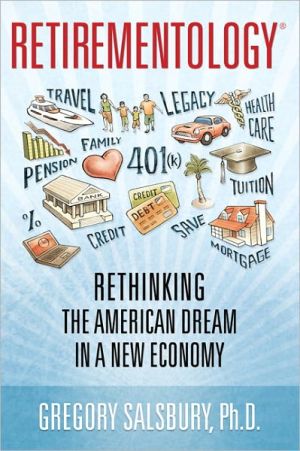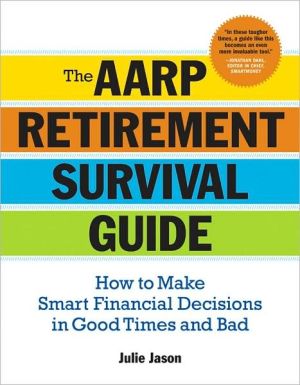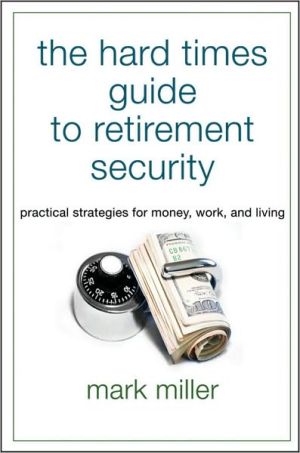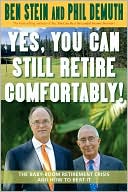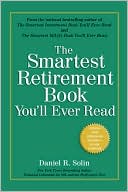Retirementology: Rethinking the American Dream in a New Economy
“A superb introduction to the necessary financial planning no American over 40 can afford to ignore.”\ Publishers Weekly\ “It’s time for many individual investors to make some hard choices. Baby Boomers are learning to deal with the fact that they really can’t have it all--at least not all at once. Retirementology is a great guide to helping them think through their plans for living, saving, and spending.”\ Marion Asnes, Editor in Chief, Financial Planning magazine\ “Retirementology applies...
Search in google:
“A superb introduction to the necessary financial planning no American over 40 can afford to ignore.”Publishers Weekly “It’s time for many individual investors to make some hard choices. Baby Boomers are learning to deal with the fact that they really can’t have it all—at least not all at once. Retirementology is a great guide to helping them think through their plans for living, saving, and spending.”Marion Asnes, Editor in Chief, Financial Planning magazine“Retirementology applies behavioral finance to retirement planning and finds we all could be doing a lot better when it comes to making decisions about retirement. But don’t despair: Not only does Dr. Salsbury crisply describe our self-destructive financial behavior, he offers much more—namely, ways we can improve financial decisions. The book is a real contribution to both behavioral finance and the field of retirement planning.”David Adler, author of Snap Judgment“Retirementology is an entertaining, yet sobering, journey through the cognitive errors and social biases harming our current and future lifestyles. Dr. Salsbury’s book is not just for retirees or those soon to retire—the earlier you read it, the better you can live!”John Nofsinger, Ph.D., Associate Professor of Finance, Washington State University, and author of The Psychology of Investing Looking ahead to retirement? Depending on your circumstances and your age, you may no longer have any margin for error. And your emotions and irrational behavior could be perpetuating a dangerous cycle of overspending and rising debt that may shatter whatever vision of retirement you still have. Welcome to the world of Retirementology.Retirementology bridges retirement planning with investor psychology and the market Meltdown of 2008 to produce an entirely new way of thinking about how we spend, how we save, how we borrow, and how we invest. Financial mistakes are deeply rooted in human nature, but you may be able to overcome them—if you understand the breakthrough principles of behavioral economics and apply them in your own retirement planning.Dr. Gregory Salsbury identifies some of the classic cognitive biases and behavioral mistakes most of us keep making when it comes to retirement planning. For example: Why will people drive 45 minutes to use a $2.00 coupon? Why won’t people sell a poor performing stock just because they inherited it from grandma? Why do people spend differently with a credit card than they do with cash? Why do people believe that they paid no income taxes because they received a refund? You’ll learn why the financial meltdown has amplified the impact of these all-too-human cognitive mistakes and discover ideas for addressing them.The bottom line for your bottom line is that retirement can no longer be ignored, viewed as a single event, relegated to a “zone,” or romanticized. Instead, you must understand how every spending and financial decision you make from here on can impact the way you will spend your golden years. Retirementology attempts to help you do just that.Retirement planning: right brain versus left brainWhy these different areas of the brain impact financial decisions—and what to do about it It’s real money! “De-layering” your financesHow to overcome the psychological tricks that separate you from your money Family matters: managing financial support decisions for your extended familyChoosing between your family or your retirement Get “long-term smart”How longevity, inflation, volatility, and your own expectations impact your retirement goals Publishers Weekly Salsbury (But What If I Live? The American Retirement Crisis) takes the burgeoning field of behavioral finance a step further by applying it to retirement planning during an economic downturn in this relevant, much needed book. He helps pre-retirees and retirees identify classic mistakes in earning, spending, saving, investing, and borrowing. With playful neologisms—retirewent, damnesia—Salsbury re-educates readers on how to prepare for their golden years during an insecure time, paying solid attention to the role one's home plays in relation to retirement, financial support for family members, tax liabilities , and health care. Of particular interest is a chart identifying common financially unhealthy traits such as procrastination and overconfidence, the consequences of such traits, and the way to rethink these traits to turn them into positives. A superb introduction to the necessary financial planning no American over 40 can afford to ignore. (June)
RetirementologySMRetirementologySM: Rethinkingthe American Dream in a New EconomyPreface\ I had what I thought was a great idea for a new book—a blend of two equally powerful and timely topics. The first topic deals with America’s retirement crisis and the challenge of prudent retirement planning in the midst of it. This subject provided the foundation for my first book, But What If I Live? The American Retirement Crisis. The topic remains of massive importance right now as the 77 million members of America’s most celebrated demographic group—the Baby Boomers—are commencing retirement.1 For the most part, the same behavior that created the challenges in the first place is continuing or accelerating. This painful conclusion led me to the second topic.\ There is a relatively new field of work developing around psychology and finance, known alternatively as behavioral economics or behavioral finance. It focuses on how investor psychology—attitudes, biases, and emotions—impacts financial decisions and behavior. Behavioral finance researchers ask questions like: Why will people drive 45 minutes to use a $2.00 coupon? Why will people wash their own car on a Saturday morning to save 10 bucks, but would scoff at the idea of washing their neighbor’s car for $10? Why won’t people sell a poor performing stock just because they inherited it from grandma? Why do people spend differently with a credit card than they do with cash? Why do millions of people believe that they paid no income taxes because they received a refund? The painfully clear message from behavioral finance research is this: When it comes to money, people don’t always behave rationally.\ I thought that the application of behavioral finance to retirement planning would be an engaging project—as much fun for me to explore as, hopefully, it would be to read. But a funny thing happened to my storyline along the way. In 2008, the market and economy crashed with a ferocity not seen in decades, and I suddenly had a third act to this play.\ As the Meltdown of 2008 was unfolding, I was the keynote speaker for an industry conference in Chicago. My subject—scheduled nearly a year in advance—was “The American Retirement Crisis.” With tongue firmly implanted in cheek, I began by telling the audience that I had good news for them, and I put up my first slide, which read:\ The retirement crisis is over.\ I then explained that this was because—and I clicked to my second slide, which read:\ Retirement is over.\ It drew some nervous laughs, because people got the point: There was a retirement crisis before all financial hell broke loose, but now we have a real mess.\ In fact, now we have investor psychology meeting retirement planning in the midst of a monumental financial meltdown. How has this new environment impacted some of the classic behavioral finance biases? And what should pre-retirees and retirees do about all this? These are the essential questions that Retirementology has identified. In the process, I hope to\ \ Identify the classic mistakes we are all making with our thinking and behavior in the key areas of earning, spending, saving, borrowing, and investing.\ Understand the scope of the financial meltdown and how it has amplified the impact of our mistakes.\ Connect those mistakes to the retirement planning process and discuss possible options to help readers aim for retirement.\ \ Retirementology is not a typical retirement planning book, nor is it a book on psychology; it is a little bit of both. Part of what has created a retirement crisis in America is the tendency to treat retirement as a separate and static event, relegate it to a zone, or even compartmentalize it. In this regard, many seem to act as if retirement planning were divorced from other monetary behavior. Quite the contrary, retirement should be viewed as a process—one that begins as soon as you engage in earning, saving, spending, borrowing, or investing. Indeed, all these things are inextricably bound. For example, a pre-retirement couple may have a choice between buying a new $55,000 automobile or buying a $35,000 pre-owned automobile and putting the remaining $20,000 in a vehicle of a different sort—a retirement account. Such decisions may have a profound impact on their lifestyles in retirement. In this regard, you can’t actually build a solid approach to retirement without also tackling your approach to all the other fiscal decisions in your life. That is why behavioral finance plays such a key role in retirement planning. If we truly want to plan correctly for retirement, we need to address the mistakes we have made, and may still be making, with regard to how we think about money, how we feel about money, and how we behave with money.\ In developing this book, our research team conducted nearly a dozen focus group interviews with pre-retirees and retirees, ranging in ages from 25 to 70. Our researchers posed a number of questions on topics such as the housing crisis, family issues, overspending, investor behavior, and more. Some of the responses are included in relevant chapters throughout the book and specifically identified as findings from our focus group research. In other cases, hypothetical names, people, and situations have been used to illustrate points. For example, Retirementology introduces some one-of-a-kind terms, descriptions, and scenarios, which have been created to help you better understand a number of the behaviors associated with investor psychology.\ In fact, the title of our book is a one-of-a-kind term...\ RETIREMENTOLOGY: ri-tahyuh r-muhnt-ol-uh-jee\ A new way of thinking about retirement planning that considers both psychology and finance against a backdrop of the worst economic crisis since the Great Depression.\ After you read the book and are better informed and educated, you may be better equipped to take another important step: Partner with an adviser for professional guidance and support. But please note: The best advice on the planet is irrelevant if you procrastinate and don’t act on it.\ Act 1: Turn the page.\ Endnotes\ \ 1 “77 Million Baby Boomers Ponder Next Career Steps,” Careers.org, October 5, 2009.\ \ © Copyright Pearson Education. All rights reserved.
Preface xiIntroduction 1Chapter 1 Great Expectations 17Chapter 2 Gold Dust on Sushi 35Chapter 3 The NoZone 63Chapter 4 House Money 79Chapter 5 Family Matters 101Chapter 6 The Tax Man Will NOT Come Knocking 129Chapter 7 Under the Knife 155Chapter 8 Lost in Translation 177Chapter 9 Long-Term Smart® 195Reterminology: The New Language of Retirement 205Index 211
\ Publishers WeeklySalsbury (But What If I Live? The American Retirement Crisis) takes the burgeoning field of behavioral finance a step further by applying it to retirement planning during an economic downturn in this relevant, much needed book. He helps pre-retirees and retirees identify classic mistakes in earning, spending, saving, investing, and borrowing. With playful neologisms—retirewent, damnesia—Salsbury re-educates readers on how to prepare for their golden years during an insecure time, paying solid attention to the role one's home plays in relation to retirement, financial support for family members, tax liabilities , and health care. Of particular interest is a chart identifying common financially unhealthy traits such as procrastination and overconfidence, the consequences of such traits, and the way to rethink these traits to turn them into positives. A superb introduction to the necessary financial planning no American over 40 can afford to ignore. (June)\ \ \ \ \ Publishers WeeklySalsbury (But What If I Live? The American Retirement Crisis) takes the burgeoning field of behavioral finance a step further by applying it to retirement planning during an economic downturn in this relevant, much needed book. He helps pre-retirees and retirees identify classic mistakes in earning, spending, saving, investing, and borrowing. With playful neologisms—retirewent, damnesia—Salsbury re-educates readers on how to prepare for their golden years during an insecure time, paying solid attention to the role one's home plays in relation to retirement, financial support for family members, tax liabilities , and health care. Of particular interest is a chart identifying common financially unhealthy traits such as procrastination and overconfidence, the consequences of such traits, and the way to rethink these traits to turn them into positives. A superb introduction to the necessary financial planning no American over 40 can afford to ignore. (June)\ \ \ Publishers WeeklySalsbury (But What If I Live? The American Retirement Crisis) takes the burgeoning field of behavioral finance a step further by applying it to retirement planning during an economic downturn in this relevant, much needed book. He helps pre-retirees and retirees identify classic mistakes in earning, spending, saving, investing, and borrowing. With playful neologisms—retirewent, damnesia—Salsbury re-educates readers on how to prepare for their golden years during an insecure time, paying solid attention to the role one's home plays in relation to retirement, financial support for family members, tax liabilities , and health care. Of particular interest is a chart identifying common financially unhealthy traits such as procrastination and overconfidence, the consequences of such traits, and the way to rethink these traits to turn them into positives. A superb introduction to the necessary financial planning no American over 40 can afford to ignore. (June)\ \ \ \ \ Publishers WeeklySalsbury (But What If I Live? The American Retirement Crisis) takes the burgeoning field of behavioral finance a step further by applying it to retirement planning during an economic downturn in this relevant, much needed book. He helps pre-retirees and retirees identify classic mistakes in earning, spending, saving, investing, and borrowing. With playful neologisms—retirewent, damnesia—Salsbury re-educates readers on how to prepare for their golden years during an insecure time, paying solid attention to the role one's home plays in relation to retirement, financial support for family members, tax liabilities , and health care. Of particular interest is a chart identifying common financially unhealthy traits such as procrastination and overconfidence, the consequences of such traits, and the way to rethink these traits to turn them into positives. A superb introduction to the necessary financial planning no American over 40 can afford to ignore. (June)\ \ \ \ \ Library JournalRetirement is a major milestone in many individuals' lives. It can be a time of great enjoyment or fraught with headaches owing to a lack of funds associated with poor planning. Salsbury (executive vice president, Jackson Life Distributors; But What If I Live?: The American Retirement Crisis) combines psychology and finance—or behavioral economics—to address the retirement-planning process. He examines mindsets that often interfere with maximizing future incomes, identifying ten main "destructive financial behaviors." These faulty strategies include spending behaviors that differ when using credit cards and cash, dependence on home appreciations to fund retirements, ignorance about how taxes impact funds and about tax-deferred financial instruments, and procrastination and overconfident behaviors that delay the building of a nest egg. Salsbury has used his extensive communications background to conduct focus groups to collect data and clarify investors' thought patterns. VERDICT Individuals, regardless of age, should read this illuminating book because it will assist them with developing meta-cognition about life planning. Recommended.—Caroline Geck, MLS, MBA, Somerset, NJ\ \ \ \ \ Library JournalRetirement is a major milestone in many individuals' lives. It can be a time of great enjoyment or fraught with headaches owing to a lack of funds associated with poor planning. Salsbury (executive vice president, Jackson Life Distributors; But What If I Live?: The American Retirement Crisis) combines psychology and finance—or behavioral economics—to address the retirement-planning process. He examines mindsets that often interfere with maximizing future incomes, identifying ten main "destructive financial behaviors." These faulty strategies include spending behaviors that differ when using credit cards and cash, dependence on home appreciations to fund retirements, ignorance about how taxes impact funds and about tax-deferred financial instruments, and procrastination and overconfident behaviors that delay the building of a nest egg. Salsbury has used his extensive communications background to conduct focus groups to collect data and clarify investors' thought patterns. VERDICT Individuals, regardless of age, should read this illuminating book because it will assist them with developing meta-cognition about life planning. Recommended.—Caroline Geck, MLS, MBA, Somerset, NJ\ \ \ \ \ Library JournalRetirement is a major milestone in many individuals' lives. It can be a time of great enjoyment or fraught with headaches owing to a lack of funds associated with poor planning. Salsbury (executive vice president, Jackson Life Distributors; But What If I Live?: The American Retirement Crisis) combines psychology and finance—or behavioral economics—to address the retirement-planning process. He examines mindsets that often interfere with maximizing future incomes, identifying ten main "destructive financial behaviors." These faulty strategies include spending behaviors that differ when using credit cards and cash, dependence on home appreciations to fund retirements, ignorance about how taxes impact funds and about tax-deferred financial instruments, and procrastination and overconfident behaviors that delay the building of a nest egg. Salsbury has used his extensive communications background to conduct focus groups to collect data and clarify investors' thought patterns. VERDICT Individuals, regardless of age, should read this illuminating book because it will assist them with developing meta-cognition about life planning. Recommended.—Caroline Geck, MLS, MBA, Somerset, NJ\ \ \ \ \ Library JournalRetirement is a major milestone in many individuals' lives. It can be a time of great enjoyment or fraught with headaches owing to a lack of funds associated with poor planning. Salsbury (executive vice president, Jackson Life Distributors; But What If I Live?: The American Retirement Crisis) combines psychology and finance—or behavioral economics—to address the retirement-planning process. He examines mindsets that often interfere with maximizing future incomes, identifying ten main "destructive financial behaviors." These faulty strategies include spending behaviors that differ when using credit cards and cash, dependence on home appreciations to fund retirements, ignorance about how taxes impact funds and about tax-deferred financial instruments, and procrastination and overconfident behaviors that delay the building of a nest egg. Salsbury has used his extensive communications background to conduct focus groups to collect data and clarify investors' thought patterns. VERDICT Individuals, regardless of age, should read this illuminating book because it will assist them with developing meta-cognition about life planning. Recommended.—Caroline Geck, MLS, MBA, Somerset, NJ\ \
